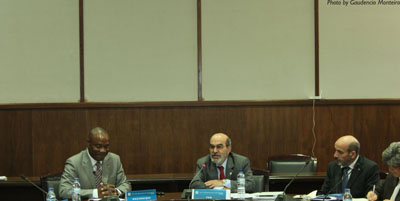FAO Chief promises more support to CPLP and Mozambique

Graziano da Silva, FAO Director General, visited Mozambique to participate in the IX Conference of Heads of State And Government of The Community Of Portuguese Speaking Countries (CPLP), held in Maputo on the 20th of July, under the theme “The CPLP and Challenges in Food Security and Nutrition”.
He was warmly welcomed by Mozambicans, who see him as the father of the Brazilian movement “Fome Zero”, a forefront campaign for many African countries.
The DG took advantage of being in the country to meet the President, the PM and the Ministers of Agriculture, Fisheries, Industry and Commerce, Women and Social Welfare and the Vice Minister of Justice.
Some of the discussions were very productive and the future FAO’s strategy for Africa, the CPLP and Mozambique was revealed.
The Minister of Agriculture José Pacheco and the FAO DG spoke about Mozambique’s political efforts to accomplish food and nutrition security for the whole Mozambican population. Pacheco said this commitment is reflected in the present five year plan and in the various development policy documents such as the National Food Security Strategy (ESAN II) and the Strategic Plan for Agricultural Development (PEDSA).
Talks involving fisheries revealed potential for Mozambique to promote its aquaculture sector. The minister of Fisheries, Victor Borges said that the average Mozambican consumption of fish per capita is just above half of the world consumption rate. “We have registered in 2011, 194,000t of fish production (both from capture and aquaculture)". However only 1000t of this amount came from aquaculture, wasting its vast potential to produce more than 4 million tonnes of fish through sea and inland aquaculture, a number which could help reduce shortages of fish in Mozambique and SADC (Southern African Development Community).
Regarding gender and agriculture the need was stressed for the transference of information on technology of agriculture and of nutrition to farmers, particularly women. “We have to strengthen the rural woman’s role as the feeder of the family. The woman´s role in feeding starts from at time of conception until the moment she shares the available food at the table. Nutritional education and the role of women in feeding are two intrinsic activities and I think it’s in this, that FAO should collaborate in this area,” said the FAO Chief. Iolanda Cintura, Minister of Women and Social Welfare spoke about their new Women Empowerment project, which is starting with an agro-processing and marketing training centre in Manhiça. She said that FAO’s technical assistance to the project would be important.
Graziano da Silva later participated at the Conference of Heads of State and Government of CPLP where he praised the bloc's adoption of the Regional CPLP Strategy for Food and Nutrition Security saying it could become an example for other countries and regional organizations. In his opinion food security cannot be achieved singularly by one country if other countries in the region endure problems of food shortages as this creates instability. Problems such as migration and conflict arise in countries enduring hunger. Mr. da Silva stressed that food security is synonym of peace.
“The Committee on Food Security (CFS) shows how the participation and inclusion of all stakeholders can transform and legitimize our debates and decisions after being reformed to include the private sector and the civil society. The Council has become the main reference of the new system of governance of global food security we are building,” said the FAO Director-General.
“FAO currently carries out projects in CPLP countries totalling around $200 million. This seems a significant amount, but it represents less than a dollar for each person of the CPLP. We can do much more with the support of the community," added Graziano da Silva.
The key message left by the FAO Chief was undoubtedly that once small family farmers in CPLP countries start producing not just enough for their own subsistence, but also surplus to sell locally, food production would increase substantially. “When addressing food security family farming should be seen by Governments as the solution and not as the problem” said the DG at a meeting with members of civil society and private sector of CPLP.

